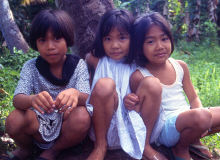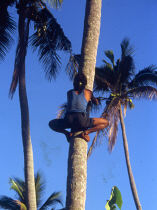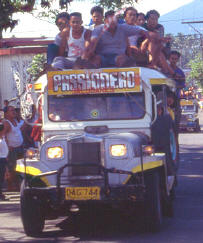Riding the Roads in the Philippines
The Philippines
I was riding a mountain bike – with a sidecar, around Laguna, then on to Marinduque Island in the
Philippines. An experience like this in a country where cycle touring is almost unheard of is
always an adventure. Travelling this way also gets you closer to the people and the culture, and
that is your reward for the hardships and frustrations you may endure during your tour.
I struggled wearily through the afternoon heat, looking for somewhere to camp. By 3:30pm I felt
I couldn’t continue much further on my first day in the saddle. I was near Pangil and quite
exhausted, burning from the ferocious heat. I pulled to the side of the road to wet my parched
mouth using the liquid I carried in my drink bottle mounted on the bicycle. I stood leaning on
the saddle of my bike trying to summon more strength. A few children gathered as if by magic. They
so often do this magical appearance, as if pulled out of a conjurer’s hat. Two young ladies soon
followed the children; their mothers. I had swathed around my neck with a towel to prevent me
burning further; I must have looked quite a sight. Certainly not a pretty one! The children came
nearer, curiosity written all over their bright shining faces. Seeing I was harmless and fairly
friendly, the mums came for a closer look too. They could speak English quite well. Even in this
remote place people can communicate in English. I was ashamed for knowing no Tagalog. I told them
I was from England as most Filipinos assume I’m from the USA.
Their names were Arlene and Amy. Seeing I was so tired they invited me to stay in their
community. Amy’s husband Terry was a kindly man. He showed me where to park my bike under
cover, and invited me to stay in his home. I explained I had my tent, not wishing to impose on
their generosity. I was surrounded by children all the time. Arlene and Amy had ten children
between them. They all wanted to look at me, this big nose in their midst. Despite having bits and
pieces of my kit scattered all over the place, I was never worried about things going missing. I
was reassured by a little child collecting my unused tent pegs and carefully placing them with the
bags in which I kept my camping gear. Amy’s husband and other young men of the community helped
carry my belongings into their home for safe keeping overnight.


Philippine Children
![]()
![]()
My tent was surrounded by trees of many varieties – all productive. Coconut, coffee, banana,
mango, guava, kalamansi and others with unpronounceable names. Water was drawn from a well some
way into the plantation. It was lovely to splash water over my face and head. I had been quite
badly sunburned on my hands and arms as I’d applied the lotion a too little late in the day. I
stood on the rocks a few yards from the well and kept splashing and pouring the cool water all
over me, trying to bring myself back into human race after being melted by the sun all day. I was
constantly watched by the children. They were so kind and thoughtful. One in particular, May Ann,
was a beautiful seven year old who filled my bowl with water and brought it to my tent. She always
seemed to want to be nearby, watching me and helping me. All the children became special to me but
May Ann was someone extra special. Before I left, her mother told me that her husband, Leonardo,
had been looking for May Ann around the home in the early morning on the day following my arrival,
but May Ann had already left her home to come and visit my tent soon after 6am. She was the
first of my many visitors throughout the day, always attentive.
For dinner, I was given a plate of cooked rice to eat. I was made so welcome by all the community. After dark
I escaped the mosquitos by going into my tent. Later, Terry came to chat with me. We sat in my
tent, illuminated by torch light. He told me that he was a happy man. He loved his work looking after the plantation and he was able to be with his family all the time. They all slept together and they were all happy. It certainly showed on their faces. Terry had built his home from pieces of wood and it was sparsely furnished. It gave adequate shelter and protection. They now had
electricity, and the light from a couple of lamps shone dimly through the gloom of the room, which
had a very low ceiling. They had an electric fan to blow away the mosquitos during sleeping hours.
They had managed to save for a small TV but it seemed to be seldom watched.


Felix climbing the coconut tree
![]()
![]()
Felix was an early arrival the next day, the first of the adults to arrive (the children were always
first). A man of very few words, he would sit contentedly chain smoking near my tent. He was a
real specialist, as I saw for myself when he shinned up the 80 feet tall coconut tree near my
tent, to release some young nuts which the children gathered from their landing places amongst the
other trees and bushes on the plantation. Felix climbed the tree just using his bare feet and
hands to grip the rough, branchless trunk. Three or four times during his ascent he paused to puff
on his cigarette. He’d been climbing the trees since he was 11 or 12 years old. Now aged 40, he
could still climb the high trees, seemingly without effort. I was presented with two of the nuts
that had been trimmed with a machete by one of the older children, in such a way that I could
drink the Buko (juice) straight from the nut. It was lovely. After the juice had been drunk the
machete was again used to cut the nuts in half so that I could spoon out the soft flesh with a
spoon. What a breakfast – a good start to the day.
I continued my travels from Laguna to Marinduques Island for one night and several young men
gathered around my tent, pitched on the beach at Gasan. They chatted amongst themselves making me
feel inadequate, not knowing their language. I was often included when they chose to practise
their English and I answered all their questions using simple words from my own language, trying
my best to speak slowly. We were later joined by Nog Nog, rather too full of the locally
distilled coconut juice firewater I’d first experienced in Luisiana. Will joined us too, a man
who had a better command of the English language than his assembled friends, which was a great
help to me.
My Filipino friend told me more about himself. He’d spent seven months at Holy Lough in Scotland during his stint with the U.S. Navy. He’d hated the cold but loved the women! He talked of the time he’d spent in Hong Kong; about his Scottish girlfriend. She was a girl of 23 and 5’11” as against his age of 40 and height of 5’5″. He told me that he’d loved her, so I
asked why they hadn’t married. He told me that this hadn’t been possible because he was already
married – and had four children. His wife had travelled with him to some of the foreign places
where he’d worked, especially to Hong Kong where he’d worked for many years. He said he was a
womaniser, even under the watchful eye of his wife, he smoked, drank and gambled on the horses.
He told me about the bad day he’d just had. He’d expected to make 3000 Piso’s but had lost 1000
Piso’s. He was not a happy man. He’d travelled to another island in search of what he called
noodles for soup, but which I later learned was the nest of a particular type of Swift from which
could be made Bird’s Nest Soup. At 8000 Piso’s per kilo he’d expected to make a lot of money, but
he hadn’t found the nests he’d expected to. He said it had cost him a lot of money in
transportation and other costs and he would find it difficult to sleep that night for worrying
about his loss. He fell asleep on the mat he shared on the sand outside my tent with Nog Nog.
One afternoon I found refuge in a tiny, open-sided, Bamboo Hut. The Barangay Captain and his
entourage arrived at about 10pm. I was woken by the flickering of the flaming torches they
carried and was somewhat alarmed as I saw all these silhouetted, rather noisy figures heading for
me out of the darkness. Only a few people had seen me in the hut, but the word had obviously
spread, maybe through the words of the farmer who had come to see me there. Now I faced the Boss
and his hangers-on in the darkness. Now wide awake, I explained who I was and what I was doing.
Thankfully, I was made welcome and told that I would be safe in the bamboo hut I’d occupied
alongside the road. I told the Captain of my water shortage and he promptly despatched two young
men with my water container. They soon returned with it filled to the brim. I was so relieved.
I now had four litres of water which I could boil before drinking.
The welcoming committee eventually departed and left me to my rest. I slept in my dirty clothes, laying on the bamboo slats. There
was a gentle breeze blowing which was so lovely to feel as it wafted the heat of the day out of my
aching limbs. Some of it blew between the bamboo slats which was especially pleasant as it meant
I was cooled all over. By about 1:30am. it got a little too cool and I wrapped myself in my
jacket and continued my sleep.


My Jeepney to Manila
![]()
![]()
The jeepney ride back to Manila took around five hours, and was one of the most uncomfortable
journeys I’ve ever experienced. By the time we arrived and I got to bed I’d been on the go for
around 30 hours and ached in every limb. During the journey my imagination worked overtime. Here
I was with a bunch of total strangers being driven into the night in an unknown country where I
didn’t know the roads and where no one, not even my friends in Manila, knew of my whereabouts. I
couldn’t even escape on my bike as it was lashed to the roof of the jeepney. I was quite
frightened – especially when two of the shady looking men wrapped towels round their heads and
covered much of their faces. It really made them look quite villainous. We stopped – ostensibly
for a coffee break. I didn’t dare move out of the jeepney. Never have I prayed so hard for my
safety!
I was unceremoniously dumped onto the road at 4:30am. Still dark. I paid the 200 Piso’s fare
and the Jeepney roared off into the night. At last I felt free from the trap that was the
jeepney, safe and in one piece – and not far from home.